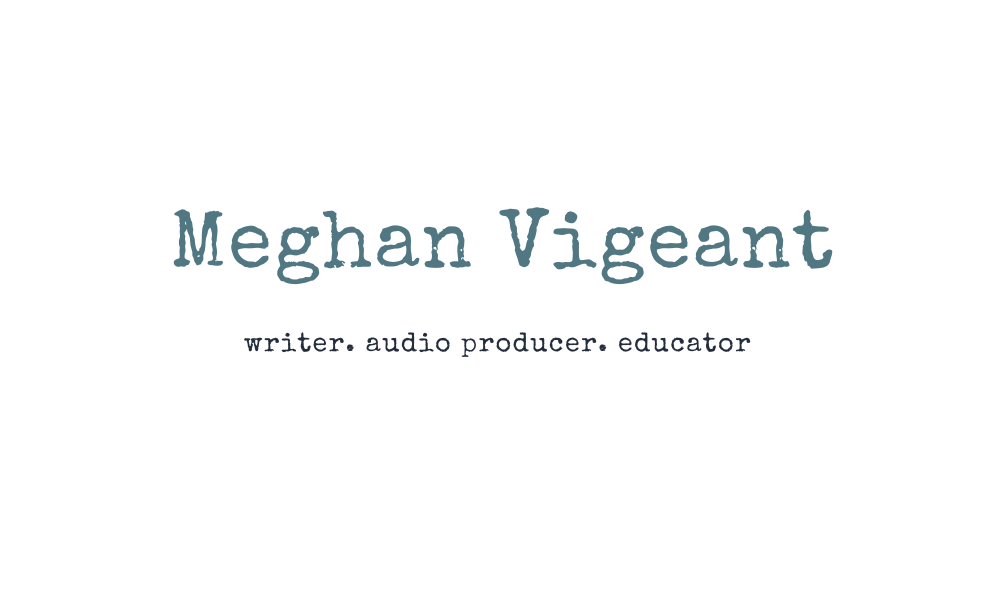I had prepared powerpoint slides chock full of information, tips and eye-catching graphics. I had fat handouts about interviewing practices and recording techniques. I had a bag full of audio gear for a demonstration. I even lugged my heavy microphone stand across campus and up to the second-floor classroom, struggling to hold it like some unwieldy rifle. I had notes and lists. I had a bottle of water. And I had big ideas about what I would teach fourteen budding oral historians in only two short hours. I wondered if it would be possible to even get past the tip of the iceberg of the how and why of gathering oral histories.
I walked into a classroom at the College of the Atlantic in Bar Harbor as a guest speaker for a class called Mapping Ocean Stories, a class designed and taught by four teachers from a trifecta of organizations: Island Institute, College of the Atlantic, and Maine Sea Grant. The objective of the class: Learn about coastal communities and the issues they face in an age of changing fisheries, political and economic uncertainty, and climate change. I was there to guide them into the oral history component of their work. They were heading into the field soon to collect stories from Maine's coastal people.
Oral historian Mary Hufford (right) interviews Everett Lilly. Source: Library of Congress
With little time to spare I dove into my agenda and asked, Why oral history? What purpose does it serve? We began our two-hour conversation. They were respectful, inquisitive, insightful, and asked good questions. They showed the attitude it takes to be successful oral historians - for an oral historian is really a student. We sit and listen and ask questions of someone, usually someone older and wiser. We learn about a way of doing, a way of living, about lives full of experiences. To be an oral historian is to be a student of life. These were some of the concepts I attempted to convey to the students.
That afternoon, on the second floor of Turrets, an imposing granite palace, I played the part of the teacher and they played the part of the students. They were learning. I was teaching. They had questions. I had answers. But, as with so many relationships in life, the tables of this dynamic can flip.
They started asking me questions that made me stop and think and wonder, and sometimes left me vulnerable and wondering, What is the answer? They brought out the conundrums of this work. What makes an oral history interview different from other kinds of interviews? How do you define it? How do you decide what information to share with the public? These were good questions. By asking such questions they gave me the opportunity do some thinking out loud and also asking them what they think. I didn’t always have the answers…and that’s okay! Sometimes it’s not about knowing exactly what to say. These were the kinds of questions that really don't have a single answer. The students can teach the teacher. The teacher can learn from her students.
I knew not to worry too much about this flip in roles; I have seen it happen in my oral history work too. Mostly, during an interview, I’m asking questions, listening and taking it in. Mostly, they’re passing on their stories and wisdom to me. I have questions. They have answers. But sometimes an interviewee doesn’t have an answer. Sometimes they have to think out loud a little bit, to reflect on how they felt about an event or why something happened. Sometimes they learn something about themselves they hadn’t considered before. They hear a question that throws them off their sturdy grasp of the past. They don't have all the answers. They too begin to wonder: Why did it happen that way? I never thought about it before. Sometimes I make my own observations about what they are telling me and bounce my thoughts back to the interviewee and ask, Does that resonate with you? How do you see it? It allows them an opportunity to consider a different perspective, to reflect, and even to learn from me.
It isn’t a one-way street. The roles can flip. We can learn from each other.
Soon these College of the Atlantic students, some with tattoos and exposed mid-drifts, some with accents "from away" and some from quite far away, will come to the kitchen tables of people with different opinions, political persuasions, educations, socio-economic situations, and lifestyles. The thing about oral history interviewing is you ask to enter into the very personal world of people who may be very different from you, but who, if you are patient, trustworthy and open, will reveal their common humanity to you and tell you stories that will fill your heart, inspire you, help you understand, bring tears to your eyes, make you laugh, and so much more. And you just may do the same for them.

